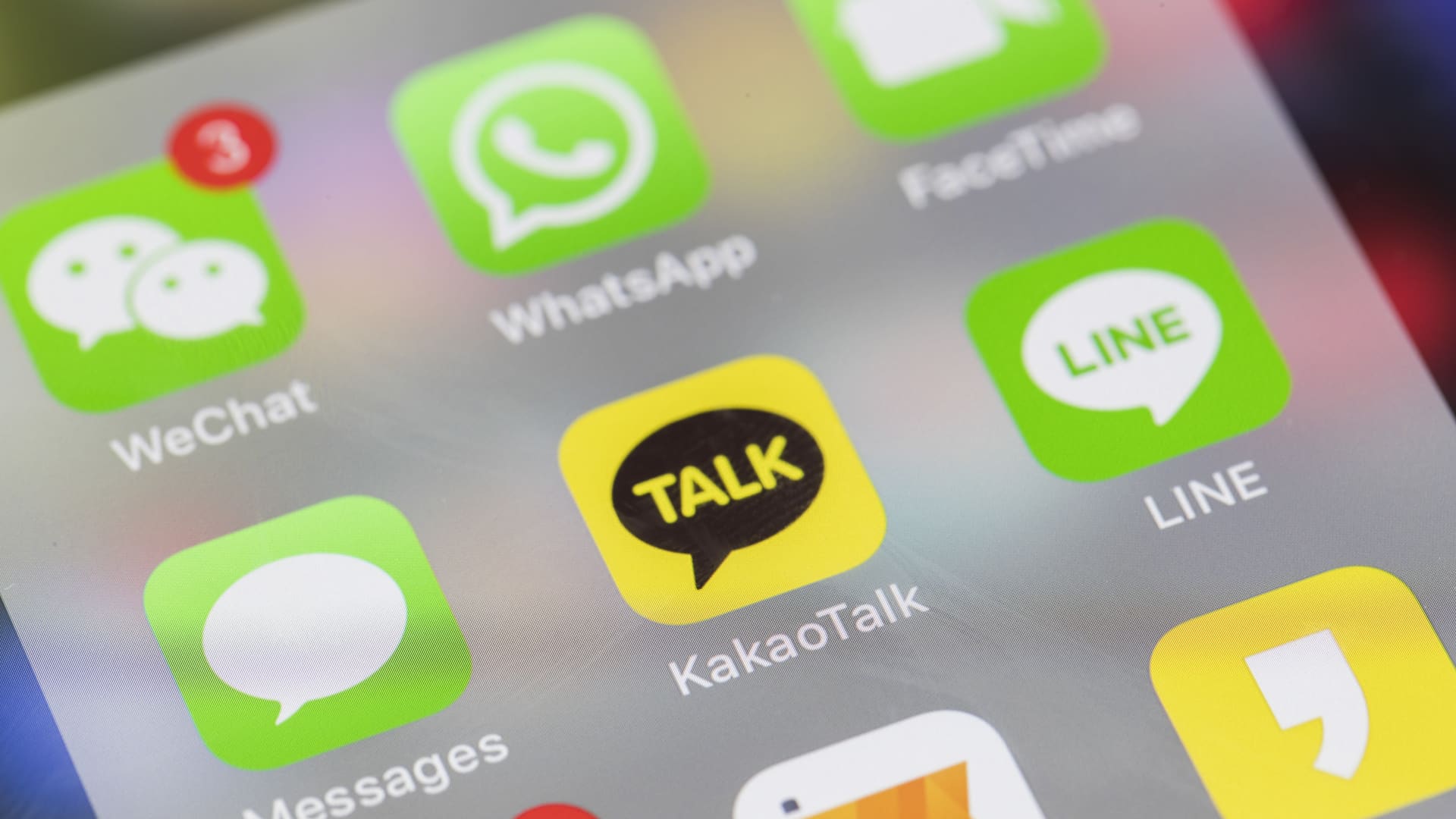
- Push notifications changed everyone for WhatsApp, taking what looked like a failed app idea to what is now the most used communications app in the world.
- But the company's focus on users' best interests has made it hard to monetize, even after its $19 billion acquisition by Facebook, now known as Meta, in 2014.
- Now Meta is looking to WhatsApp to drive additional value and revenue through its new business-focused premium service.

In this weekly series, CNBC takes a look at companies that made the inaugural Disruptor 50 list, 10 years later.
Following the launch of the iPhone in 2009, Former Yahoo! employees Brian Acton and Jan Koum had the idea to create an app that would allow users to update statuses on their contact list, which would then signal to their contacts where they were, or what they were up to at the moment. Koum recruited the services of iPhone developer Igor Solomennikov, and they created their first prototype.
We're making it easier for you to find stories that matter with our new newsletter — The 4Front. Sign up here and get news that is important for you to your inbox.
Among its first users, however, the app proved to be unpopular, and was riddled with connectivity issues and crashes. It was beginning to look like a failed concept, and Koum debated abandoning the project altogether and pivoting to a different job.
But then, Apple launched push notifications, and that changed everything for what is now the most popular messaging app worldwide — WhatsApp.
Push notifications, which allowed automated messages to be sent by an application without the app needing to be open, provided the potential for a more interactive model of Acton and Koum's idea.
Money Report
Subsequently, the company altered the app's function to then send push notifications out when a user changed their status. Quickly, the small circle of the founding team's friends that used the app began to ping each other with custom statuses throughout the day, serving more as instant messaging than the originally intended status markers.
Leaning into this trend, they redesigned the app, and released WhatsApp 2.0 in August 2009, focusing on the instant messaging component — which quickly became the app's defining feature.
The newly redesigned app immediately got attention, and the number of active users grew to 250,000 in what seemed like overnight.
Soon after, Acton persuaded former colleagues at Yahoo! to invest $250,000 in seed funding. After months in beta, the iPhone application was released on the App store in November 2009, with Blackberry and Android versions following soon after. It also switched from a free service to a paid one, charging $1 a year to cover the cost of sending verification texts to users. Over the next few years, WhatsApp continued to rapidly grow, supported by over $50 million in investment funding from Sequoia Capital.
In February 2014, WhatsApp was acquired by Facebook (now Meta) for $22 billion, making it the largest acquisition of a venture capital-backed company to date. Following that, WhatsApp became the most popular messaging app in the world, with more than 600 million users. Several major changes also followed, including web capabilities, voice calling, and a removal of the $1 annual subscription fee.
Just as WhatsApp had capitalized off of the emerging trend of push notifications, it did the same with encryption. WhatsApp added end-to-end encryption to every form of communication on its service, meaning that no one, even WhatsApp employees, could access the data that was sent across its network.
Ultimately, WhatsApp's success was found within its emphasis on user experience, embellished by the priority of privacy and a disdain for advertisements. WhatsApp democratized phone-based communication and kept user interest at the forefront of their decision making.
"Behind every product decision," the company stated, "is our desire to let people communicate anywhere in the world without barriers." This was the reason behind ending the $1 annual subscription fee, in order to remove the barrier faced by users without payment cards. And it was also the reason they stood firm in not employing third-party advertisements on the app, which would have inevitably cluttered the interface for users.
When WhatsApp was acquired by Meta, the company infamously promised, "No ads, no games, and no gimmicks." To founders Acton and Koum, this phrase represented the ethos of the company.
"You can still count on absolutely no ads interrupting your communication," Koum said at the time. "There would have been no partnership between our two companies if we had to compromise on the core principles that will always define our company, our vision and our product."
Yet, in 2016, that promise was revoked, when the company launched a major update to its privacy policy that announced it would start sharing user information and metadata with Facebook.
Although the company's end-to-end encryption continued to protect the content of user communication, the update allowed WhatsApp to share a myriad of other user information with Facebook, including users' phone numbers, app use frequency, information on how users interacted with one other, IP address, language, mobile network, and even location information, cookies, and payment data.
Not long after this update, both founders Acton and Koum stepped down from WhatsApp and Facebook.
"At the end of the day, I sold my company," Acton told Forbes. "I sold my users' privacy to a larger benefit. I made a choice and a compromise. I live with that every day."
But while WhatsApp's commitment to users' best interests, including data privacy, helped the company become one of the most ubiquitous apps in the world, it also prevented it from ever really becoming profitable. With no ads — which accounts for 97% of Meta's revenue — WhatsApp has maintained little profitability.
Today, Zuckerberg is hoping to change that, particularly by focusing on WhatsApp Business, which first launched in 2018. He recently drew comparisons to how the company monetized Facebook and Instagram after building large audiences in a conversation with CNBC's Jim Cramer.
"WhatsApp is really going to be the next chapter, with business messaging and commerce being a big thing there," Zuckerberg told CNBC earlier this month.
WhatsApp Business currently has two components, the free WhatsApp Business app for small businesses, which allows businesses to communicate directly with customers, and the WhatsApp Business platform, an API for larger corporations, that charges companies for every conversation after the first 1,000.
Aiming to further gain incremental revenue from paid features, WhatsApp is planning to soon roll out premium services within their small business app, which would allow businesses to manage chats across up to 10 devices and utilize customizable WhatsApp click-to-chat links.
Click-to-chat advertising, which has already been a point of success for WhatsApp in recent years, allows consumers to click on a company's ad from Facebook or Instagram and immediately be directed to a conversation with that business on WhatsApp. Meta has pointed to this offering in particular as a major growth driver, and an indication of the company's future direction.
"We think messaging in general is the future of how people are going to want to communicate with businesses and vice versa. It's the fastest and easiest way to get things done," a WhatsApp spokesman said.
This comes at a time of great uncertainty, as Meta recently missed on both the top and bottom lines for Q2, and gave a troubling forecast for the next quarter.
Whether or not it can successfully monetize the more than 2 billion people that use WhatsApp today is yet to be seen.
One thing is certain, however — that Zuckerberg and Meta is betting that WhatsApp Business will be an essential component of the company's future.
"Click-to-message is already a multi-billion dollar business for us and we continue to see strong double-digit year-over-year growth," outgoing Facebook Chief Operating Officer Sheryl Sandberg said on the company's second-quarter earnings call. It "is one of our fastest growing ad formats for us."
Sign up for our weekly, original newsletter that goes beyond the annual Disruptor 50 list, offering a closer look at list-making companies and their innovative founders.






